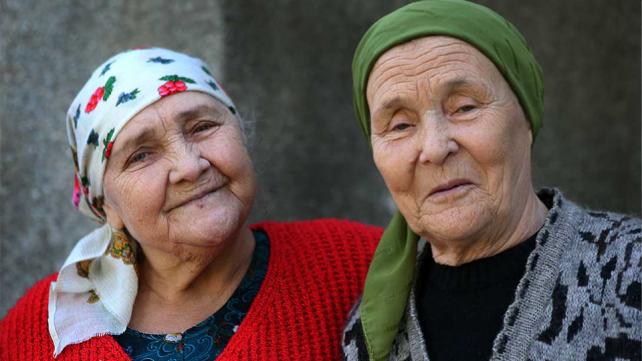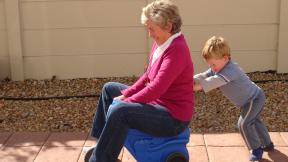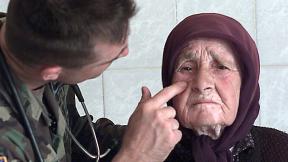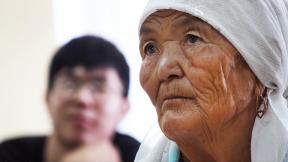
My uncle, my mother's eldest brother, died early this week in Pakistan. He was about 80. Inna lillahi wa inna ilaihi rajiun. To Allah we belong and to Him we return.
While living in a “third world” country, he may have faced difficulties getting quality health care with the onset of sickness and old age. But one thing he didn't lack was a loving family and respectful environment. To my knowledge, he did not experience loneliness, neglect, or the ignorance of his needs. Alhamdulillah.
The same can be said, for the most part, for senior citizens in most Muslim countries. There is a social structure, an extended family, in which an individual can spend the rest of his or her life surrounded by doting children and grandchildren, as well as peers they may have grown up with their whole lives.
This is not the case for many Muslim seniors in North America.
The United Nations has designated 1999 the International Year of the Older Person. While some may dismiss this as token acknowledgement of senior citizens worldwide, it's still a good time for Muslims to remember our seniors in North America, and the challenges they face, which have largely been ignored.
The General Picture
Overall, Muslim communities do treat their elderly better than how mainstream North American society does.
“I think some of their needs are being addressed by virtue of the type of community that we are,” says Aneesah Nadir, Director of Social Services for the Arizona Muslim Family Health and Social Services in Tempe. “The Sunnah tells us to respect our elders, we're a mutual assistance kind of community, not an individualistic kind of community so I think that helps.”
“Because we are also largely an extended family based system, and by that I mean because grandma and grandpa usually live with the family, that provides a lot of care for the elders,” she adds in an interview with Sound Vision. “That's for those who have family.”
But this is not the case for all Muslim senior citizens.
“The problem comes when the elder person doesn't have children or doesn't have children who are Muslim because then they don't have their children to take care of them,” notes Nadir, adding that there are also Muslim children who are simply unable to take care of their aging parents.
Muslim Senior Citizens: Who are They
Perhaps part of the reason for the lack of focus on Muslim seniors and their needs in the North American context is their small number.
Statistically, senior citizens make up only 0.67 percent of the Muslim population in the United States, according to A Report on Muslim Population in the United States of America, authored by Ilyas Ba-Yunus and M. Moin Siddiqui.
This report was published last year by the Center for American Muslim Research and Information (CAMRI) based in New York city. Senior citizens in this report refers to those aged 65 and up.
These Muslim senior citizens include three main categories.
The first are those who immigrated to the U.S. at the turn of the century.The second are the parents of those who came with the wave of Muslim immigration in the 1960s and 1970s. The third are Muslims who converted to Islam and fall into this age group.
Immigrant Muslim Senior Citizens
This group is predominantly senior citizens brought over by their children from abroad. According to Winnipeg, Canada-based Muslim social worker Shahina Siddiqui, these seniors are usually brought over by their children because they want to take care of their aging parents.
In some cases, this is done for economic reasons: adult children feel it is cheaper to bring mom and/or dad over to live with them in Canada or the U.S. instead of sending money “back home” to help them out financially on a regular basis.
Another secondary motive could also be that aging Muslim parents provide free babysitting or free domestic help for two working parents.
“One of the motives of bringing parents over is that they will do the babysitting,” she says “It is significant because the parents feel used, they have no social life outside of this, they're too old and it affects their health and relationship with their kids,” says Siddiqui.
“This is free labor really, so there's exploitation of the elderly,” she adds.
New Muslim Senior Citizens
According to Siddiqui, most converts tend to be between the ages of 20 and 45, and it is rare to find Muslim senior citizens who have converted to Islam.
However, they do exist. They are often the most isolated because they do not have a Muslim family to fall back on. They are either isolated from their families or they do not want to live with non-Muslim family members.
There are also a number of older converts from the African-American community, who accepted Islam in the 1930s and 1940s.
“Their family is the Muslim community,” notes Zarinah Awad, a volunteer who has been helping elderly Muslims in Phoenix, Arizona for about ten years. “They don't have all the options other elderlies might have, their church, where the church has different kinds of programs for the elderly to be involved in. We have to provide for them in those areas,” she says.
Muslim senior citizens are lonely
Loneliness is probably the biggest problem Muslim seniors face.
While this applies especially to those who are converts and living alone, it is also applicable to those living with their families, who may be surrounded by people not interested in really talking or socializing with them.
This loneliness can also affect their diet and lead to self-neglect.
“Some of them don't eat because they're lonely,” notes Nadir. “Who wants to eat alone?”
The Elderly Are Often Neglected
The neglect of elderly Muslims, in particular those who live on their own, is another sad situation.
Often they need help with things as basic as reading prescriptions, which they can no longer do as their eyesight weakens with age.
Or with the case of foreign-born Muslim seniors, they cannot even understand the prescription, and so are almost completely dependent on caregivers for their medicine.
As well, going to the doctor, the dentist and doing weekly grocery shopping are no longer mundane facts of life: they can become insurmountable hurdles to senior citizens, who may no longer be able to drive on their own, see well or hear well.
Elder Abuse
While most Muslims would consider elder abuse a non-issue in the Muslim community in North America or abroad, the sad reality is that it isn't.
“I have seen from physical abuse to emotional abuse and physical abuse comes in the form of hitting, pushing, shoving,” says Siddiqui. “Emotional abuse comes in the form of threats ‘I'll send you back, I'll kick you out of the house, ‘ and also neglect, meaning, they don't have a social life, they are not taken out of the house.”
Abuse can also include domestic violence within the elderly couple's marital relationship, as well as the denial of their income or pension by their children.
While the elder abuse that does exist in the Muslim community is minuscule compared to the cases found in mainstream American society (see Fact Sheet: Elder Abuse at www.soundvision.com),”these things are happening and they are not isolated cases, they are enough for us to pay attention,” says Siddiqui.
“It does exist,” says Hadayai Majeed, Network organizer and co-founder of Baitul Salaam network, a national domestic violence intervention and advocacy group based in Atlanta, Georgia. “If we've talked to four or five people a year, you can multiply that by four in the areas we're in. Usually what happens is that when someone comes to us there are four or five other people who are not talking,” Majeed notes.
One smaller example of elder abuse Siddiqui gives is of a family where the parents were told that once the husband comes home they cannot leave their rooms. This was between 5 p.m. and 9 a.m. the following day.
“That's ridiculous, that's inhuman,” she says.
The “Sandwich Generation”
But taking care of elderly parents is difficult, especially for those who also have the responsibility of their kids, regardless of if mom or dad is taking care of them during the day. Both Nadir and Siddiqui describe Muslims in this category as the “sandwich generation”.
There is a tremendous amount of stress involved, and this generation is caught between their young kids and their older parents.
As well, most homes in North America are too small for extended families.
Do we need Muslim “Old Folks' Homes”?
“Ten years ago if you had said we need nursing homes for Muslims, I would have said get lost. But since then I have personally worked with five families that have had to put their parents in nursing homes because of their health needs,” says Siddiqui.
For senior citizens that have special health needs it is often impossible not to resort to the help of health care professionals. In severe cases, putting elderly Muslim parents into nursing homes is really the only option.
This is particularly the case for Muslim seniors with multiple disabilities and Alzheimer's disease. But putting parents in an “old folks” home leaves many Muslims feeling extremely guilty, thinking they were unable to take care of their parents.
As well, they may have to deal with the stigma such an action brings within the Muslim community itself.
On the other hand, converts often have the opposite problem with their non-Muslim parents. As Muslims, they realize their tremendous responsibility to their parents as Muslims, and want their parents to live with them.
Their parents, on the other hand, want to retain their independence.
Siddiqui points out there is a need for Muslim senior housing, based on Islamic principles and which would maintain Islamic dietary practices and the segregation of the sexes, for example.
They would also be places where seniors could perform Islamic worship and socialize together.
Muslim Senior Citizens Are The Whole Community's Responsibility
The responsibility for Muslim seniors falls not only on their children though. The “sandwich generation” should be getting help from the Muslim community in taking care of their aged parents. This means helping them with errands like going to the doctor, for instance, or just taking them out for a drive for a few hours once a week.
This responsibility is even more important when it comes to converted Muslim seniors, who are often estranged from their families. They need this kind of help and feeling of brother and sisterhood than those who are blessed to be living with their families.
“I call it a natural support system,” says Nadir. “What we normally would have if we had a full-fledged Muslim community with all the components like the extended family, like living geographically close to each other, all worshiping together. We should be close enough to know when our brother or sister is in pain.”
Photo Attribution: Steve Evans - http://commons.wikimedia.org/wiki/File:Tajikistan_(1603443496).jpg








Comments
Subject.. aged n old age homes
Rubbish. SIN. WHAT GOES AROUND CUMS AROUND TENFOLD. KARMA.. PLEAS SYOP ENCOURAGING THE CHILDREN OF THIS ERA TO DITCH AND DUMP THEIR PARENTS AND OLD FAMILY MEMBERS IN HOMES. BULLSHIT.. IT S GRAVE SIN TO ABANDON THE PARENTS WHO HAVE YOU A BLOOMING LIFE.
Location
Old age homes for Muslim
Hello
I would like to know information about old age homes for Muslims in Chennai ...can I please know further details...9444100846
Location
OLD AGE HOMES FOR MUSLIMS
It is high time that the elderly mothers and fathers and grand fathers/mothers are absolutely neglected. So as we give zakat to orphans education and livings same we must need to crest donations for old age homes for Muslims elderly people where they can easily survive their tenure. The curse of elderly can destroy entire ummah and families together. They are treated worst than animals. Can we muslims brotherwood look at Christians how many old age home they have in the world as well as hindus. Surely their must be survey all over India specially in Maharashtra where elderly muslim elderly are not look after at all. They should be given justice if not at their own house, should get from community. Their must be a system implemented to recover their expense thru government from their very close kins with strict rules to be made by the organization of their community which will be attach to GOVT ATTACH NGO. There should not be hanky panky business. Or the mosques of particular area should take responsibilities to recover zakat money for old age homes. Which would be monitored by nearby Chartered Accountant Firm. Inshallah I hope our elderly will give duaa to the organist management. My prayers with all elderly people who are neglected by recent young ones.
Location
Muslim Nursing Homesc
As a retired Realtor I have been asked to develop or acquire a facility. I know of none for 200 miles. I would welcome ANY guidance and suggestion. Requirements unique to the Muslim residents needs
call me 24/7. (609)332-7727.
I am aged 78 and recall the needs of my parents. Please help me help them
Location
Edler support
I like the information.
Location
i would like to find out from your team hope i am in the wrong stream but anyway i just want to get your comment how to receive a financial help and from what muslim institution for a couple in the early sixties to exist peacefully in the islamic way if otherwise if you can advise to find them some sort of employment so that it will be a great help. Allah bless
Location
Add new comment